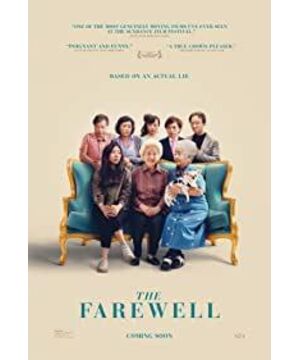(Actually because I don't think it's as bad as 2 stars, it would be nice to have 2.5 stars)
The film is not so perfect, some lines are too blunt and straightforward, and cultural differences are completely reflected in dialogue. Even Bili's uncle directly said "this is the cultural difference between China and the United States.". But as the second feature film directed by Wang Ziyi, there is still something remarkable.
The filming of this film is very real. The China under the camera is just like what we usually see, the grandma who is doing Tai Chi, the aunt who is drying the quilt on the horizontal bar, and the uncle who suddenly puts his clothes on his stomach while walking on the road. Shirtless people playing mahjong, and the sound of hawkers chanting from time to time. It's all China we are familiar with.
As a returnee who has lived abroad for several years, Bili's feelings are similar. People always ask me, do you think China is better or foreign countries are better? Do you still know how to say Chinese? Can you understand them over there...
At first, I would answer their questions patiently, but over time, I have to ask this question every time I go back to China, and just like Bili, I can only answer "it's okay".
Back to movies.
The first ten minutes of the film basically explained all the basic elements of the film. The hospital, the doctor's sentence "the result is not very optimistic", a phone call, and then the condition of the grandmother, the wedding under the guise. This allows us to understand what the film is talking about, but - it's too clear. Almost all the plots are explained and all the conflicts are explained. (The scene where Bili is in the room with his parents). So the whole movie doesn't show more in the last 80 minutes, which is one of the downsides of this movie.
In the film, I think there is something wrong with Bili. In the scene where my uncle and dad are at the window, my uncle first reprimanded Bili, he is your dad and you shouldn't care about him (smoking)! This sentence made me laugh out loud. The director must have been in the United States for a long time to have this stereotype. Such as children can not contradict their relatives and the like. In fact, it is not. Compared with the serious father-daughter/mother-daughter relationship, the Chinese prefer to communicate with their parents on an equal footing. Besides, a normal relative should ease the atmosphere at this time, instead of reprimanding a relative and child you haven't seen a few times. And what my uncle said to Bili later made me feel even more inappropriate. The core of a movie and the lines that best express the idea of the movie were said by a supporting role in a scolding way without any modification.
And the breaking point of this movie was actually completed by Haohao. The character who didn't say a few words in the whole film burst into tears in front of us, which really made the audience a little confused and didn't have much sense of substitution.
So in fact, the film as a whole is still being shot along the lines of the Americans, but it is indeed an American film. Even if the film is about life in the East, there are still some stereotypes in Western thinking and perspectives that will still be revealed.
What this film wants to express is still too superficial. One can see at a glance what the film is trying to tell, the cultural differences, the grandmother's love for her granddaughter. and many more.
But this "love" is too superficial.
Love is not when I say that I love you very much, I love you very much, and it is not because I love you when I run down the street, or cry, or make a few phone calls. Instead, I think it might be better to show the memories of Bili's life with his grandparents before he was six years old.
In "Deeper Than the Sea", a typhoon used a typhoon to tie the broken apart family together again. The name "Deeper Than the Sea" does not mean how much I care about you. I care that you are deeper than the sea. It's the memories of their life together, even if we face parting after the typhoon, our accumulated feelings are already deeper than the sea.
This kind of love comes from getting along and living day after day.
The cast of the film is pretty ordinary except for the two fully-characterized characters, Grandma and Bili. It seems that they are all supporting roles and background boards, and there are no characters. "Never Stop" is a good example. Counting the supporting roles with lines, there are 11 people in total. Everyone has their own personal characteristics and charm. The poisonous sister, the grandfather who speaks coldly but actually cares about his son, the manager of Matsushizushi who used to be a bad boy and is now afraid of his wife... In summary, the scene of this movie is very real, that is, we can see it every day around us look. But the story and characterization, including the way of telling, are still insufficient. There is still a lot of room for improvement.
(A lot of private goods of Hirokazu Koreeda are entrained, and Hirokazu Koreeda's film is really good. Saori)
View more about The Farewell reviews











